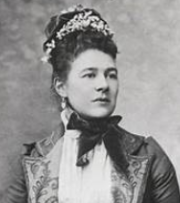Our History
MANDATE and BRIEF HISTORY
The National Council of Women of Canada (NCWC) is a long-standing organization dedicated to improving the lives of women, families, and communities across Canada. Founded in 1893 by Lady Ishbel Aberdeen, the NCWC has been at the forefront of advocacy for women's rights and social issues for over a century.
About Lady Ishbel Aberdeen
Lady Aberdeen was a pioneering social reformer and the driving force behind the founding of the NCWC. She used her influence and dedication to unite women from across Canada to work collaboratively on issues affecting society, particularly the rights and welfare of women and children. Despite facing societal resistance and the challenges of her time, Lady Aberdeen championed the cause of women’s leadership and empowerment.
Lady Aberdeen’s Key Accomplishments
- Founded the National Council of Women of Canada in 1893, establishing a national platform for women’s advocacy.
- Played a critical role in the establishment of the Victorian Order of Nurses (VON), advancing professional nursing and health care access in Canada.
- Supported the development of the Children’s Aid Society, enhancing child welfare and protection initiatives.
- Advocated for improvements in women’s health, education, and social services.
- Influenced legislation and policy changes that advanced women’s rights and social justice.
- Promoted collaboration among women’s organizations to amplify their collective voice.
Connections to VON and Children’s Aid Society
Lady Aberdeen’s leadership extended beyond the NCWC. Through her commitment:
- She helped launch the Victorian Order of Nurses (VON), providing essential community nursing services, especially to women and children in rural and underserved areas.
- She was instrumental in supporting the growth of the Children’s Aid Society, fostering protection and care for vulnerable children across Canada.
The NCWC's mission focuses on several key areas, including health, education, senior care, arts and culture, the environment, economics, fundamental human rights and the status of women. Through active engagement and a democratic process of developing resolutions and adopting policies, the organization strives to create better opportunities and enhance awareness through action and community involvement.
The Council's structure is comprehensive, encompassing national, provincial, and local councils of women, as well as independent organizations and individual members. This extensive network allows the NCWC to address a wide range of issues and advocate for policies, laws, and services that benefit women and society as a whole. The organization employs various methods to pursue its goals, including formulating resolutions, organizing petitions, conducting surveys, initiating letter-writing campaigns, and direct meetings with government officials and when appropriate corporations and unions.
Throughout its history, the NCWC has been instrumental in promoting significant social and health care reforms. It has played a crucial role in establishing important institutions such as the Victorian Order of Nurses, the Children's Aid Society, and the Consumers' Association of Canada. The Council continues to adapt to contemporary challenges, addressing issues like climate change, support for Indigenous communities, and the protection of rights in the digital world.
For a detailed history of the National Council of Women of Canada please refer to

Lady Aberdeen, first president of the National Council of Women of Canada (NCWC).